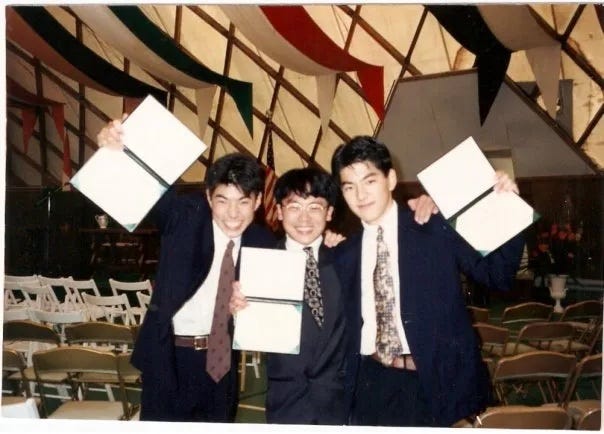Something not many are willing to say or admit

“Creativity is a privilege for wealthy people.”
Dr. John Maeda, the prominent designer/technologist extraordinaire, said with a slight sense of sadness during my conversation with him a little while ago (Note: the picture above is from a different event a few years prior). “I know it’s horrible to say this,” he added.
John needs no introduction so I’ll spare you the details. I started admiring John’s work early and have been fortunate enough to meet John directly in the late 1990s when I was still a college student. A couple of decades later, my not-so-secret proud moment was when he introduced me as his imaginary younger brother at an event he was hosting. In case you didn’t know, John and I are of Japanese descent, both working in design and technology. At another small event, we were seated next to each other by the organizer because we were the only Asians, to which John took offense. But I digress. That’s probably another post.
This comment from John about creativity and privilege came when I asked him whether creativity is nature or nurture and how one would teach someone to be creative.
“The first thing I have [come to] realized was that you have to be wealthy.”
I wasn’t ready for his answer, I must admit. John continued, “You have to have some level of privilege to be creative. Not everyone gets to be creative in society.”
There are numerous books, articles, talks, and speeches preaching about how anyone can be creative. I’ve certainly said this and have been an advocate of creativity belonging to anyone and everyone. What John was talking about is that what we assume as “anyone and everyone” may actually not be anyone and everyone.
As he started to explain that one first has to have a roof over their head, food to eat, etc, before they get to be creative, I quickly realized that I had been completely negligent of a large segment of the population who are simply trying to get by and even just survive.
My family ran a small furniture and architecture business in the countryside of Japan. The cost of living in that little town was much cheaper than in the metropolis that was Tokyo. While we weren’t all that wealthy and my parents did have to borrow money to send the three of us to study abroad, we could get by relatively comfortably. We always had a roof over our heads, food on the table, and the time to play soccer, paint, or play music.
I had the privilege.
Case in point: the photo from my high school graduation reeks of so much privilege that it makes me blush.

Before I asked John if you can teach someone creativity, I naively expected him to say “Yes, you can teach anyone to be creative.” John’s comment on creativity and privilege made me realize that he was talking about something much more fundamental to human needs: to live.
The quote “necessity is the mother of all inventions” is possibly the counterargument to John’s statement that “creativity is a privilege for the wealthy.”
The point that John was making, however, isn’t that you can’t be creative if you don’t have money. You can. Creativity shouldn’t be taken away from anyone based on their wealth. When you have enough wealth, though, to not have to worry about the roof over your head and food on the table, you just have the mental, material, and temporal capacity to pursue creativity.
He made me realize that I first needed to be grateful for what my parents had provided me decades ago. Yes, I worked hard to get to where I am but years before that, it was the hard work and sacrifices they had made for me and my siblings to be able to go overseas and pursue what we wanted.
Paul Rand’s advice: Make lots of money.
John had another story to share with me. And this time, it was a piece of advice he had gotten from Paul Rand, the legendary giant of American graphic design of the 20th century.
“Young man, I have something very important to tell you. Make lots of money.”

Mr. Rand told the young John. Even though John initially thought this wasn’t good advice to tell a young person, he says he eventually realized that this was the most useful piece of advice he had ever gotten.
When Mr. Rand was publishing his monograph, his publisher didn’t want to spend extra dollars to cover a special printing technique that Mr. Rand wanted to apply. He ended up using his own money to produce the output he desired. “Without money, you end up having to do what you don’t want to do. Make enough money so you can do what you want.”
Does money make you more creative?
Early in my career, I used to get into conversations with my colleagues about how much we were making. Almost every time, I would find out that I was making less than others, sometimes significantly less. Once or twice, I worked up enough nerves to go talk to my boss about the possibility of a raise.
The result? Those types of conversations never failed to make me feel like sh*t.
Either I felt worse that I was making less than my colleagues/friends, or that I felt kind of dirty about asking for more. I decided to stop talking about money with others.
As I gradually started to make more money, I also realized that money didn’t make me happier. I also didn’t feel more creative because of it either.
When I graduated from college and moved to New York City with no job and no savings, let alone a savings account, I did have to make ends meet by taking whatever job I could find. Still, my parents had given me and my brother a couple of thousands of dollars for the first few months after college. That gave me enough cushion to work on my portfolio, and make random creative stuff that would get recruiters to notice me. I was making no money but had been given just enough wealth to be okay. That is the privilege.
What matters is that we can start by acknowledging the privilege we had/have over others and be grateful for it.
Whether you agree with John’s statement about creativity and privilege or not may not matter. What matters is that we can start by acknowledging the privilege we had/have over others and be grateful for it.
If you are curious about these conversations, please subscribe to my podcast “The Creative Mindset” wherever you get your podcast:
Looking for cool gifts? Check Rott515 store!
